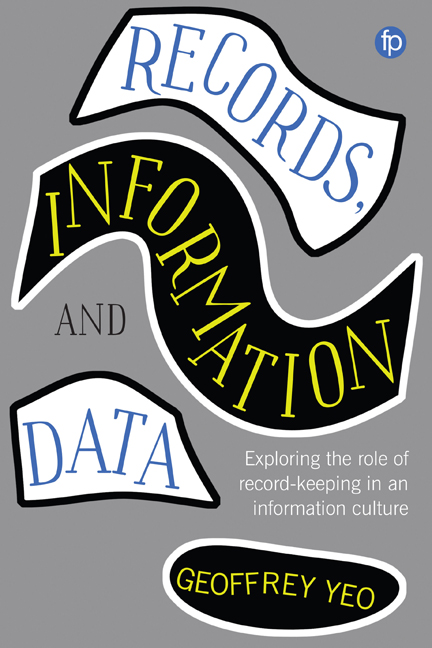Book contents
- Frontmatter
- Contents
- Introduction
- 1 The Making and Keeping of Records: a Brief Historical Overview
- 2 Thinking About Records and Archives; the Transition to the Digital
- 3 Archivists, Records Managers and the Rise of Information
- 4 Finding a Way Through the Hall of Mirrors: Concepts of Information
- 5 Records and Data
- 6 Representation, Performativity and Social Action: Why Records Are Not (Just) Information
- 7 Managing Information or Managing Records?
- Concluding Thoughts: Record-Keeping Present and Future
- Index
Concluding Thoughts: Record-Keeping Present and Future
Published online by Cambridge University Press: 24 September 2019
- Frontmatter
- Contents
- Introduction
- 1 The Making and Keeping of Records: a Brief Historical Overview
- 2 Thinking About Records and Archives; the Transition to the Digital
- 3 Archivists, Records Managers and the Rise of Information
- 4 Finding a Way Through the Hall of Mirrors: Concepts of Information
- 5 Records and Data
- 6 Representation, Performativity and Social Action: Why Records Are Not (Just) Information
- 7 Managing Information or Managing Records?
- Concluding Thoughts: Record-Keeping Present and Future
- Index
Summary
This book has presented a view of records and information that is substantially different from the views presented in most contemporary textbooks and published guidelines about organizational recordkeeping. It has rejected attempts to characterise records simply as containers of information, or as a special kind of information that demands stricter control. Instead, it has offered an understanding of records as persistent representations through which social acts are performed, and an understanding of information as one of the many affordances that records offer to those who engage with them. In proposing these understandings, it has attempted to put forward fuller arguments than are usually found in writings about records and information, where the views that records contain information, or are a category of information, are often asserted but rarely argued in any depth.
Almost certainly, many readers of this book will find its approach controversial. Some may object to its questioning of the ‘information paradigm’ for records, in which leading players in records management have made so much investment; others may insist that record-keeping is essentially pragmatic and may doubt the relevance of concepts and ideas borrowed or adapted from academic disciplines such as philosophy and psychology. Practitioners of information management or information governance are unlikely to want to see information as an affordance. In early-21st-century writings addressed to businesses and government agencies, information is almost always presented as an organizational ‘asset’, a measurable entity that can be managed for an organization's benefit and regulated to ensure security and compliance – a view of information that sees it as a material entity and associates it with some of the central concerns long allied with records management. The arguments in this book, however, rest on a belief that robust professional practice should always be grounded in robust professional theory, and on a conviction that professional theories cannot be wholly self-contained but must draw on other fields of knowledge. The book problematises the notion of information assets and suggests that the ‘assets’ that are the usual focus of information management – at least when that elusive term is used in the sense discussed in Chapter 7 – can best be understood, not as autonomous information, but as contestable propositions asserted at particular times and in particular contexts.
- Type
- Chapter
- Information
- Records, Information and DataExploring the Role of Record Keeping in an Information Culture, pp. 191 - 200Publisher: FacetPrint publication year: 2018



